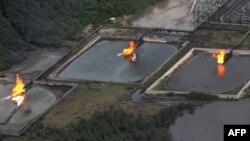The rising number of attacks on oil pipelines is presenting a challenge to the new government of President Muhammadu Buhari as he formulates an expected overhaul of Nigeria's oil industry.
Buhari is thought to be working on a variety of initiatives to reform how Nigeria's oil and gas — Nigeria's biggest industry — is managed.
While Nigeria produces more crude than any other country on the continent, oversight of the industry is lax and government revenues routinely misspent, leaving millions of Nigerians impoverished and the environment of the oil-producing Niger Delta region befouled by oil spills.
Historically targeted for theft, pipelines are often damaged by thieves who syphon oil to sell or refine themselves and by aggrieved community members who believe they've gained nothing from the oil extraction happening on their land. How to protect this vital infrastructure will likely be part of any reforms. Buhari proposes.
Vandalism surges
According to statistics from the state-owned Nigerian National Petroleum Corporation (NNPC), 3,700 cases of pipeline vandalism were reported in 2014, an increase of more than 4.5 percent from the previous year.
But despite the increasing attacks on pipelines, Buhari's government has decided not to continue using private security companies run by former militia leaders to secure pipelines, a policy of Buhari's predecessor Goodluck Jonathan.
Those companies were successful in guarding pipelines in parts of the southern half of the Niger Delta region, which according to NNPC statistics saw less incidences of theft from oil pipelines than elsewhere in the country.
Dolapo Oni, head of energy research at Ecobank, says thieves have started targeting pipelines in the northern parts of the Niger Delta, as well as outside the commercial capital Lagos, areas which are not protected as well.
“That’s an area that before wasn’t as much of a focus for the oil thieves as it is now," he said, adding that the vandalism forces companies to shut down production, hurting Nigeria’s overall economy
“It’s not in the amount that is stolen, but in the amount that has to go offline and the impact in the wider economy," he said. "So it impacts in power; it impacts in the amount of crude oil that can be exported.”
Demise of militias
Alhaji Mujahid Dokubo-Asari once led a notorious militia that disrupted production throughout the Niger Delta region. He characterizes his years of violent struggle in delta's creeks as part of a fight for a greater share of the region's oil wealth.
Now running a security company tasked with protecting pipelines, Dokubo-Asari said he has not been paid since president Buhari took office in May, forcing him to withdraw his services guarding pipelines in the southern Rivers State.
“Yes, not a dime was paid," said Dokubo-Asari
"We are still waiting our trial," he said. "We have consulted with our lawyers.”
But Femi Adesina, a spokesman for President Buhari, said the new government decided not to continue the policy of using groups like those of Dokubo-Asari. He said it's the responsibility of law enforcement to secure pipelines.
And siphoning crude can be deadly. Italian oil company Eni said on Friday an explosion killed 12 members of a maintenance crew repairing a damaged pipeline in the Niger Delta. The company said the line was damaged by sabotage.




